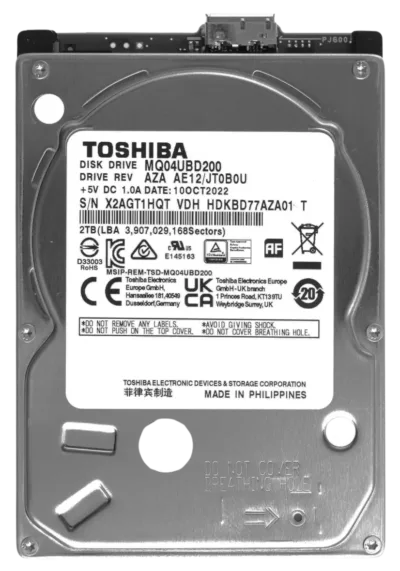Data Recovery from Toshiba MQ04 (SMR) – Northwind Data Recovery
The Toshiba MQ04 hard drive series first appeared in late 2017 with a 1TB model, followed in February 2018 by the 2TB version (MQ04ABD200). At the end of the same year, the MQ04UBD400 with a capacity of 4TB was introduced.
Why Toshiba MQ04 drives are “different”
With the MQ04 series, Toshiba radically changed the storage architecture: it adopted SMR (Shingled Magnetic Recording) across the entire family, implemented a second translator (2nd translator), shingled read/write flows, and moved almost all of the Service Area from the PCB to the platters. The result is high density with certain behavioral peculiarities.
Problem #1: SMR behavior & firmware
As with other SMR drives (WD, Seagate), MQ04 disks run continuous background tasks (Media Cache reorganization). This leads to long delays, timeouts, and low performance—especially when transferring many small files. When surface issues, worn heads, or firmware module problems coexist, the drive can collapse: no identification, unusual noises, or persistent BUSY.
Problem #2: Complex MediaFiles & insufficient tools
The internal structure of MediaFiles (critical firmware components) is highly complex and only a few labs worldwide have decoded it adequately. Commercial tools (PC-3000, MRT, DFL, etc.) provide limited to insufficient support, resulting in many MQ04 drives being incorrectly labeled as “non-recoverable.”
Problem #3: High prevalence = many cases
The combination of low cost and good reliability made MQ04 drives very popular—and consequently a frequent “visitor” to data recovery labs.
Northwind’s solution
The Northwind Data Recovery team has carried out in-depth reverse engineering on MQ04 drives and developed in-house methods for safe data recovery from the entire Toshiba MQ04 series. We are among the few labs worldwide with a documented ability to recover these models.
- Specialized firmware procedures for Media Cache, translators, and SA residing on the platters.
- Write-safe extraction with priority on data integrity.
- Diagnostic check and work plan before any reading.
Free diagnosis: we assess at no cost and inform you transparently about the probabilities and the price before proceeding.
Symptoms that “scream” MQ04/SMR issue
- The drive appears as RAW/Unallocated or is not recognized.
- Very slow transfers/freezes with many small files, prolonged BUSY.
- Unusual noises, S.M.A.R.T. anomalies, wrong capacity/name.
What to do (and avoid) — very important
- Do not run “repair / initialize / format / chkdsk” — it can worsen Media Cache mapping.
- Do not write anything to the drive.
- Disconnect the drive immediately.
- DO NOT entrust the drive to people who don’t know what they’re doing.
- Call us immediately.
Recovery process
- Contact, ship the drive & free diagnosis
- Specialized MQ04/SMR evaluation (confirming compatibility with our methods)
- Written quote & timeline with full transparency
- Recovery & verification (file list)
- Delivery to a new medium or via secure upload
Warning (critical)
SMR drives—especially Toshiba MQ04—initiate write operations when they detect a problem. These writes can permanently destroy your data. Do not entrust the drive to inexperienced handlers, even if they call themselves “data recovery engineers.” Before any action, a Write-Protect (WP) must be applied to these drives by the recovery technician. It is ABSOLUTELY CRITICAL for your data!
Frequently Asked Questions
Can you recover data from all MQ04 models?
Success depends on the exact fault. We have in-house procedures for a wide range of SMR/firmware scenarios across all MQ04 drives.
Why does the drive “freeze” and not respond for hours?
Media Cache background operations in SMR can cause long timeouts, especially when additional firmware issues exist.
Do you need to open the drive?
Only when the fault requires it (e.g., heads). Many cases are resolved with firmware troubleshooting procedures.
Do you work with a no data—no fee policy?
Since 2003, our company has consistently applied a no data—no fee approach.

